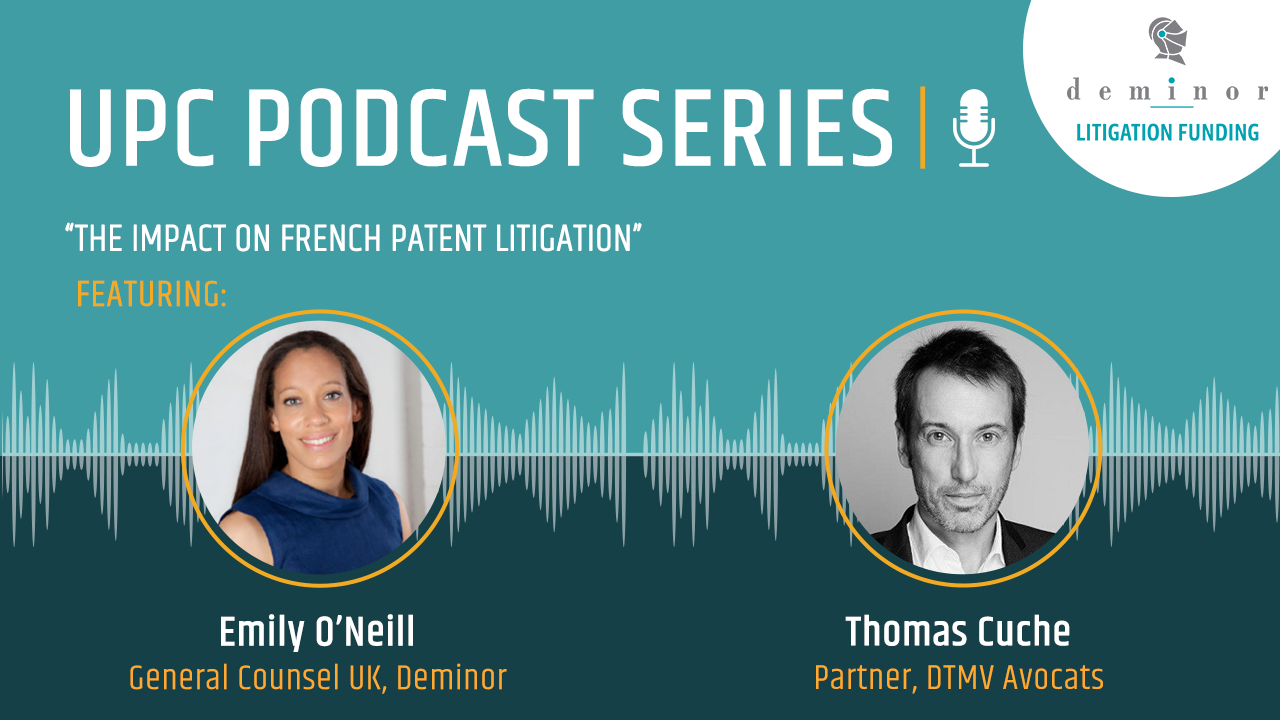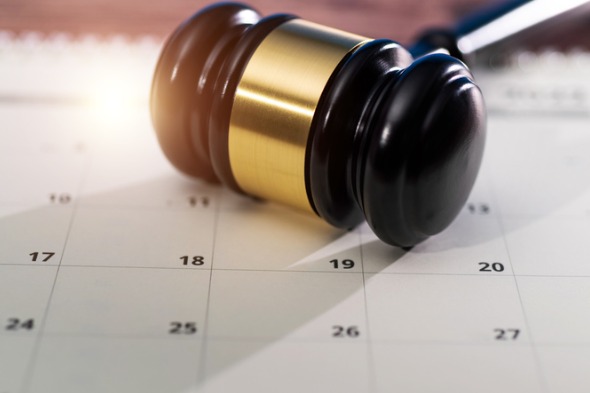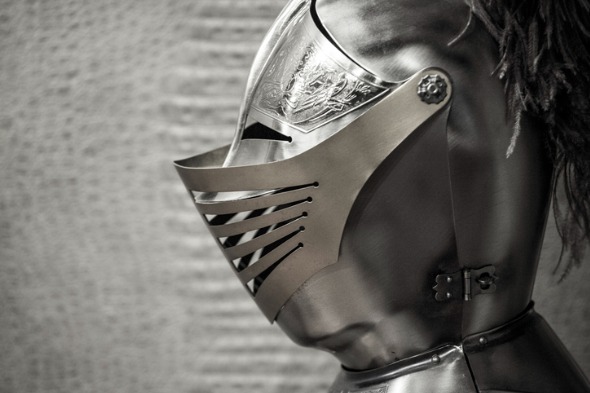In this podcast series, Emily O'Neill General Counsel UK and Global Intellectual Property lead for Deminor Litigation Funding, undertakes interviews with global professionals to understand the implications of the new Unified Patent Court (UPC).
Deminor welcomes you to join this conversation as we summarise the key elements of the conversations between Emily O'Neill and these experts, as captured in the podcast transcripts below.

What is the UPC?
The Unified Patent Court (UPC) is a new European court system designed to harmonise and simplify the patent dispute landscape in Europe.
The UPC was established in order to provide a unified patent enforcement system with jurisdiction over ratifying EU member states. Countries that are Member States of the European Patent Convention (EPC) but are not EU member states cannot join the Unitary Patent or Unified Patent Court. As a unified court with a multi-state jurisdiction, the UPC hopes to be faster, more efficient and more cost-effective in resolving patent disputes.
The UPC's structure is made up of a Court of First Instance that is divided into central, local and regional divisions. Its central divisions are located in Paris and Munich. The third seat of the central division was originally assigned to London. The Italian Foreign Office published a press release that an agreement has been reached with France and Germany to set up a branch of the Central Division in Milan. This agreement now needs to be approved by the other UPC contracting states during the next meeting of the Administrative Committee in June 2023. The press release states that the Milan court is in the process of being set up and will be operational within the next year. In the interim, the Presidium of the UPC decided, that initially, the Paris and Munich central division seats will share this caseload. Cases concerning human necessities are assigned to Paris and those involving chemistry and metallurgy to Munich for now.
The UPC’s Sunrise period launched on March 1st and allowed patentees to opt out of the exclusive jurisdiction of the new system to take effect from the court coming online on 1 June. Approximately 460,000 European patents and patent applications have been opted-out during Sunrise. Opt-outs are still possible now and at least during the 7-year transition period, unless proceedings are pending in the UPC, and will take effect once filed.
However, this is a new and untested forum, located in civil law jurisdictions but with elements of common law such as disclosure, cross-examination and adverse party costs. Notable jurisdictions such as the UK and Spain are not within the UPC - How will companies mitigate their commercial litigation risks in this environment?
Podcast Preface:
Deminor General Counsel UK, Emily O'Neill (EON), speaks with Thomas Cuche (TC), IP Partner at DTMV Avocats, who specialises in trademark, patent, copyright and unfair competition cases.
During the interview, he provides insights into the likely impact of the upcoming Unified Patent Court (UPC) on French companies, including how it will influence damages and what companies it will attract.
Podcast Transcript:
EON - The UPC will be a sea change in patent litigation in Europe. What does that look like from the perspective of the French market?
TC - This is long awaited by professionals, lawyers, patent attorneys, French (and non-French) practitioners. But French stakeholders globally seem rather passive – they look at this new jurisdiction and don't really know how to handle it yet, even though the first action filed before the UPC ever seems to from a French company!
Generally speaking, it is expected that the UPC will be attractive for non-EU entities, (above all American entities and Asian entities) especially in the telecoms field and especially where the infringing product is marketed in the whole EU. Legal, and also technically qualified judges are skilled and highly qualified.
Generally speaking, the evidentiary rules similar to some extent to the UK (and perhaps the US) with priority given to witnesses and depositions. For this further reason, US entities may find it attractive. It should also be attractive for litigation funding companies because the whole process should be easier to anticipate. It is designed to last a year maximum until a first decision on the merits. The cost will be high but predictable, and the decisions should also be predictable.
EON - One of the attractions of the UPC is the broader damages pool available across the 17 states that have ratified the UPCA. How do you think damages will look during the first 3 years of the Court?
TC - Damages is a big issue for the success of the UPC.
A downside of the current system is the generally low amounts awarded when infringement is admitted. This is sometimes a little bit disappointing for the stakeholders. Before the UPC, there will be no punitive damages. Nonetheless, damages can be awarded for up to 17 countries.
Also, whether the infringer knew or should have known that it was engaging in infringing activities will be taken into account. So, there will be room for increasing the damages if the infringer knew it was infringing.
Nonetheless, during the next few years, the rules on the damages from the UPCA will be progressively implemented since it is applicable only as of June 1st, 2023. Before that date, domestic laws should apply in relation to damages.
This means all damages caused by infringing acts committed up to 31 May will be assessed under national laws. If you claim an infringement of the French part of a European patent, the German part of the European patent, or the Italian part of the European patent, and you win, and the court says there is infringement in France, Germany and Italy, then you will have to evidence to the court the damages you have suffered according to each country’s law, not the UPCA. Thus, for the next few years, we will have a mix of systems.
EON - For damages related to infringing acts that take place before June 1st 2023, how similar are national laws and will the court go to its national jurisdiction for an assessment on damages? Or will they take their own view about what the jurisdictions would have decided?
TC - The national laws of Member States are all implementing the EU directives. Accordingly, national laws of UPC Member states should be consistent for the assessment of damages, with slight differences.
For all the acts committed before its entry into force, the UPC will apply the national law of each concerned country where the national part of a patent is enforced.
I do not expect that the UPC will refer to national courts for the assessment of damages. Rather it will apply the national relevant domestic provisions as domestic courts would have done.

EON - How consistent do you think UPC decisions will be with European Patent Office (EPO) decisions on validity?
TC - This is one of the main questions being asked by our clients and stakeholders.
The EPO and the UPC are two different bodies, they are independent from each other, so they should work independently. But obviously, you will have interplays.
Firstly, it does not seem possible to file an invalidity action before the UPC against a patent application. That means until the EPO has granted a patent, it is not possible to ask the UPC to rule on its validity.
Then, once granted, two-degree opposition proceedings can be triggered before the EPO. If you come before the UPC with a European patent which has been granted by the EPO and upheld by the EPO again after a decision from its board of appeal, my guess is that the UPC will be reluctant invalidating the patent unless new grounds of invalidity are invoked.
It should also be noted that Article 33 UPCA provides that the UPC may stay the proceedings when opposition proceedings are pending before the EPO, and a decision is likely to be issued quickly. In this case, the agreement provides that the UPC can start the proceedings or wait for the EPO decision. So, I guess the question is whether it’s more effective to file an opposition than file an invalidity action before the UPC instead.
EON - How is your firm approaching the UPC? Will you have a specialist UPC team and national teams, and how are you going to structure UPC cases?
TC - Our approach is based on flexibility and capacity. We have a consistent team of patent litigators. Depending on the matter, we build or participate in ad hoc teams, made of patent attorneys and litigators, French and/or from other countries, working together for the best interests of the clients. We stick with this “dual approach” which proved to be successful as it fits the client’s needs and provides excellent quality work at reasonable costs.
EON - Are you excited about the UPC?
TC - Of course! I think all patent litigators are excited about this new jurisdiction. It happens once in a professional life, or less. So yes, I am very excited, as are all my friends, colleagues and people working in the patent field. I don't know if the stakeholders and clients are so excited. But we will find out!
EON – We have a new jurisdiction with new procedural rules, how do you think judges will respond to this new court?
TC - The quality of the decisions will be a key issue to the success of the UPC. I think we can be confident that decisions will be excellent because the appointed judges are “la crème de la crème”. Of course, they will have to adapt to different legal cultures, and their respective interpretation of the rules, either from the UPCA or the Rules of procedure, may differ, but I am convinced they will work together for the benefit of the UPC.

UPC Podcast Series - Next steps and further information:
Thanks for joining Deminor's UPC Podcast Series as we deep dive into the ins and outs of the new Unified Patent Court.
Keep a look out for our upcoming interviews as Deminor General Counsel UK and Global Intellectual Property lead, Emily O'Neil, speaks with several more experts to get their insights on the UPC.
If you would like to connect with either Emily or Thomas Cuche on LinkedIn, please click on the links below:
Emily O'Neill - Deminor, General Counsel UK and Global IP lead
Thomas Cuche – IP Partner at DTMV Avocats
***
Further Reading:
- https://www.deminor.com/en/case-studies/co-funder-proposes-sharing-of-litigation-funding-risk-to-leverage-deminors-in-house-due-diligence-capability
- https://www.deminor.com/en/case-studies/financing-assertion-of-patents-protecting-manufacturing-processes
- https://www.deminor.com/en/case-studies/telecoms-patent-assertion-multi-jurisdictional-campaigns
- https://www.deminor.com/en/case-studies/canadian-innovative-start-up-preparing-for-a-david-v-goliath-litigation-funding-battle
- https://www.deminor.com/en/case-studies/whats-the-risk-assessing-the-risk-of-counter-assertion-by-the-defendant-in-patent-litigation
- https://www.deminor.com/en/case-studies/overstepping-the-mark-litigation-funding-trade-mark-infringement
- https://www.deminor.com/en/case-studies/lights-camera-action-recovering-damages-for-infringement-of-rights-in-a-short-film
- https://www.deminor.com/en/case-studies/recovering-damages-for-stolen-software-through-litigation-funding
- https://www.deminor.com/en/case-studies/funding-in-the-pharma-sector-/-investing-in-a-case-where-litigation-is-already-ongoing





